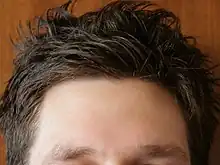otsa
Finnish
Etymology
From Proto-Finnic *oncca, borrowed from Proto-Germanic *anþiją (compare Old Norse enni, Old High German endi).[1]
Pronunciation
- IPA(key): /ˈotsɑ/, [ˈo̞ts̠ɑ]
- Rhymes: -otsɑ
- Syllabification(key): ot‧sa
Declension
| Inflection of otsa (Kotus type 10/koira, no gradation) | ||||
|---|---|---|---|---|
| nominative | otsa | otsat | ||
| genitive | otsan | otsien | ||
| partitive | otsaa | otsia | ||
| illative | otsaan | otsiin | ||
| singular | plural | |||
| nominative | otsa | otsat | ||
| accusative | nom. | otsa | otsat | |
| gen. | otsan | |||
| genitive | otsan | otsien otsainrare | ||
| partitive | otsaa | otsia | ||
| inessive | otsassa | otsissa | ||
| elative | otsasta | otsista | ||
| illative | otsaan | otsiin | ||
| adessive | otsalla | otsilla | ||
| ablative | otsalta | otsilta | ||
| allative | otsalle | otsille | ||
| essive | otsana | otsina | ||
| translative | otsaksi | otsiksi | ||
| instructive | — | otsin | ||
| abessive | otsatta | otsitta | ||
| comitative | See the possessive forms below. | |||
| Possessive forms of otsa (type koira) | ||||||||||||||||||||||||||||||||||||||||||||||||||||||||||||||||||||||||||||||||||||||||||||||||||||||||||||||||||||||||||||||||||||||||||||||||||||||||||||||||||||||||||||||||||||||||||||||||||||||||||||||||||||||||||||||||||||||||||||||||||||||||||||||||||||||||||||||||||||||||||||||||||||||||||||||||||||||||||||||||||||||||||||||||||||||||||||||
|---|---|---|---|---|---|---|---|---|---|---|---|---|---|---|---|---|---|---|---|---|---|---|---|---|---|---|---|---|---|---|---|---|---|---|---|---|---|---|---|---|---|---|---|---|---|---|---|---|---|---|---|---|---|---|---|---|---|---|---|---|---|---|---|---|---|---|---|---|---|---|---|---|---|---|---|---|---|---|---|---|---|---|---|---|---|---|---|---|---|---|---|---|---|---|---|---|---|---|---|---|---|---|---|---|---|---|---|---|---|---|---|---|---|---|---|---|---|---|---|---|---|---|---|---|---|---|---|---|---|---|---|---|---|---|---|---|---|---|---|---|---|---|---|---|---|---|---|---|---|---|---|---|---|---|---|---|---|---|---|---|---|---|---|---|---|---|---|---|---|---|---|---|---|---|---|---|---|---|---|---|---|---|---|---|---|---|---|---|---|---|---|---|---|---|---|---|---|---|---|---|---|---|---|---|---|---|---|---|---|---|---|---|---|---|---|---|---|---|---|---|---|---|---|---|---|---|---|---|---|---|---|---|---|---|---|---|---|---|---|---|---|---|---|---|---|---|---|---|---|---|---|---|---|---|---|---|---|---|---|---|---|---|---|---|---|---|---|---|---|---|---|---|---|---|---|---|---|---|---|---|---|---|---|---|---|---|---|---|---|---|---|---|---|---|---|---|---|---|---|---|---|---|---|---|---|---|---|---|---|---|---|---|---|---|---|---|---|---|---|---|---|---|---|---|---|---|---|---|---|---|---|---|---|---|---|---|---|---|---|---|---|---|---|---|---|---|---|---|---|---|
| ||||||||||||||||||||||||||||||||||||||||||||||||||||||||||||||||||||||||||||||||||||||||||||||||||||||||||||||||||||||||||||||||||||||||||||||||||||||||||||||||||||||||||||||||||||||||||||||||||||||||||||||||||||||||||||||||||||||||||||||||||||||||||||||||||||||||||||||||||||||||||||||||||||||||||||||||||||||||||||||||||||||||||||||||||||||||||||||
Derived terms
Compounds
References
- Kylstra, A.D.; Hahmo, Sirkka-Liisa; Hofstra, Tette; Nikkilä, Otto. 1991–2012. Lexikon der älteren germanischen Lehnwörter in den ostseefinnischen Sprachen. Amsterdam: Rodopi. (pp. 312–313)
Ingrian

Meehen otsa (1).

Kylän otsa (3).
Pronunciation
- (Ala-Laukaa) IPA(key): /ˈot͡sɑ/, [ˈo̞t͡s̠]
- (Soikkola) IPA(key): /ˈot͡sɑ/, [ˈo̞t͡sɑ]
- Rhymes: -ot͡s, -ot͡sɑ
- Hyphenation: ot‧sa
Noun
otsa
- forehead
- end, tip
- 1936, V. I. Junus; P. L. Maksimov, Inkeroisin keelen oppikirja alkuşkouluja vart (ensimäine osa), Leningrad: Riikin Ucebno-pedagogiceskoi Izdateljstva, page 4:
- Alkakaa vaa kirjuttaa suureel bukvaal i otsaa pankaa tocka.
- Start writing in big letters and at the end put a full stop.
- 1937, V. A. Tetjurev, N. J. Molotsova, transl., Loonnontiito oppikirja alkușkoulua vart (toin osa), Leningrad: Riikin Ucebno-Pedagogiceskoi Izdateljstva, page 65:
- Sormiin ja varpain otsiis inmihisel ja monikkail elokkail ollaa kynnet, toisiil elokkail kapjat tali sorkat.
- At the tips of fingers and toes humans and some animals have nails, other animals [have] hooves or cloven hooves.
-
- border (of a village)
Declension
| Declension of otsa (type 3/koira, no gradation) | ||
|---|---|---|
| singular | plural | |
| nominative | otsa | otsat |
| genitive | otsan | otsiin |
| partitive | otsaa | otsia |
| illative | otsaa | otsii |
| inessive | otsaas | otsiis |
| elative | otsast | otsist |
| allative | otsalle | otsille |
| adessive | otsaal | otsiil |
| ablative | otsalt | otsilt |
| translative | otsaks | otsiks |
| essive | otsanna, otsaan | otsinna, otsiin |
| exessive1) | otsant | otsint |
| 1) obsolete *) the accusative corresponds with either the genitive (sg) or nominative (pl) **) the comitative is formed by adding the suffix -ka? or -kä? to the genitive. | ||
Synonyms
- (end; tip): otsain
References
- Ruben E. Nirvi (1971) Inkeroismurteiden Sanakirja, Helsinki: Suomalais-Ugrilainen Seura, page 367
Rwanda-Rundi
Etymology
From Proto-Bantu *-jòkia, causative of Proto-Bantu *-jòka.
Derived terms
- umwotsi (“smoke”)
This article is issued from Wiktionary. The text is licensed under Creative Commons - Attribution - Sharealike. Additional terms may apply for the media files.